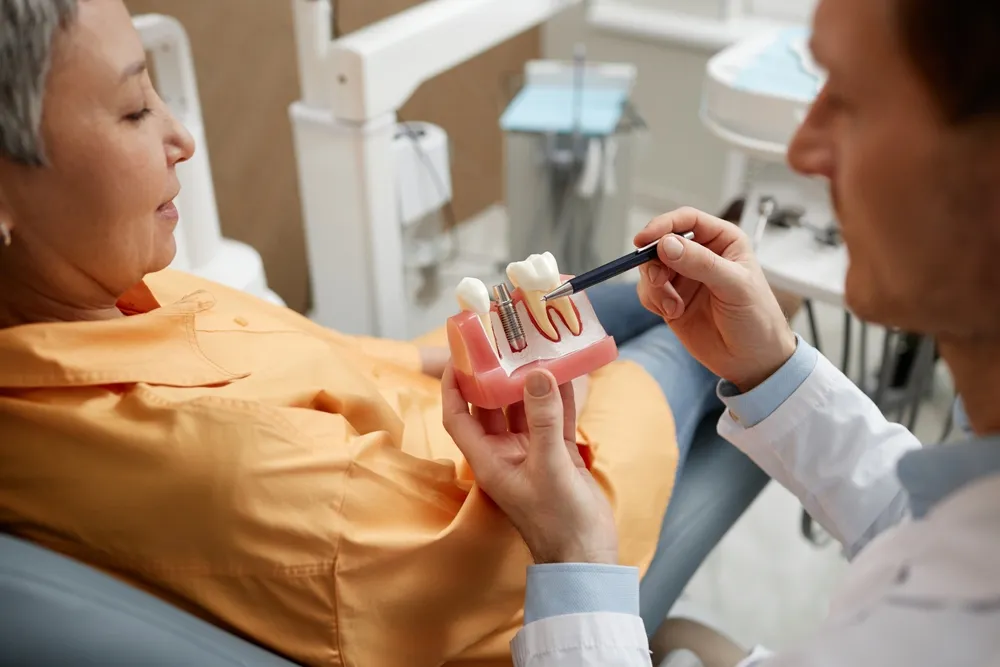Dental health is crucial for maintaining overall well-being, particularly for seniors who may face tooth loss. Dental implants, while effective, are often costly, making them inaccessible for many without financial assistance. Fortunately, seniors in the UK have options for subsidized dental implants through various programs and resources. Seniors can access opportunities, ensuring affordability and improving their quality of life with better dental health.
NHS Dental Services
The National Health Service (NHS) in the UK provides a range of dental treatments, albeit within specific guidelines and limitations. While the NHS typically covers basic dental services and certain complex treatments, the challenge lies in accessing dental implants specifically.
 SeventyFour/Shutterstock
SeventyFour/ShutterstockNHS funding for dental implants is highly selective and generally reserved for cases where they are deemed medically necessary, such as reconstructive needs following oral cancer or significant jaw trauma. Seniors who believe they could qualify should consult with their NHS dentist to understand whether they meet the criteria for NHS support in receiving dental implants. If eligible, the NHS can significantly reduce the cost.
Private Dental Insurance and Plans
For seniors who do not qualify for NHS-funded implants, exploring private dental insurance or plans can be a viable option. Many insurance providers offer dental plans that cover a portion of implant costs. While these plans require premiums, they can be cost-effective in the long run for individuals requiring extensive dental work.
Researching and comparing dental insurance plans is crucial. Seniors should look for plans with comprehensive coverage options, including implants, while considering factors such as waiting periods, the percentage of costs covered, and any associated annual limits. Engaging with an insurance advisor can be beneficial to clarify plan details and make informed decisions.
Non-Profit Organizations and Charities
Several non-profit organizations and charities focus on providing dental care to those in need, including seniors. These organizations sometimes offer financial assistance or subsidized dental care, including implants, depending on their resources and funding.
Charities such as Dentaid UK and British Oral Health Foundation, while not guaranteeing implant services, often provide valuable information and support to help seniors find affordable dental care. Seniors are encouraged to reach out to these organizations to inquire about available programs or partnerships that might assist in funding their dental implant procedures.
University Dental Programs
Dental schools across the UK offer services through their training programs. These institutions often provide dental care at reduced rates, as students, supervised by experienced professionals, carry out the treatments. While not all university programs may offer dental implants, some larger programs may provide them at a lower cost.
Seniors considering this route should contact university dental schools to understand the specific services offered, costs, and any potential waiting lists. This option not only makes dental implants more affordable but also contributes to the education of future dental professionals.
Financing Options and Payment Plans
Many dental clinics in the UK offer financing options or payment plans for patients seeking more manageable ways to pay for implants. These plans typically spread the cost over several months or years, alleviating the pressure of a lump sum payment.
Seniors interested in dental implants should discuss these options with their chosen clinic. Dental financing companies often work directly with clinics, offering loans specifically for dental procedures, sometimes at competitive interest rates.
A New Smile
Accessing subsidized dental implants in the UK requires awareness of available resources and strategic planning. From NHS services to private insurance and charitable organizations, seniors have multiple avenues to explore. By understanding these options and proactively seeking assistance, seniors can improve their dental health and overall quality of life, making dental implants a more achievable goal. Prioritizing dental health not only enhances daily living but also supports long-term physical health and self-esteem.